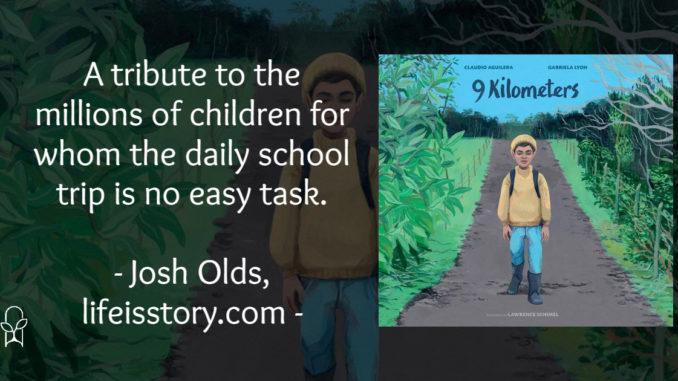
Also by this author: Niños: Poems for the Lost Children of Chile, One Million Oysters on Top of the Mountain, It's So Difficult, Different: A Story of the Spanish Civil War, Madani's Best Game
Published by Eerdmans Books for Young Readers on February 28, 2023
Genres: Children's
Buy on Amazon
Goodreads

A memorable, compelling story about the perseverance of a child and the human right to education.
The sky is still dark when a young boy leaves home for school. He has a long path ahead: nine kilometers—over five-and-a-half miles—through the mountains and rain forests of Chile. But the boy doesn’t mind. While he walks, he can count butterflies and lizards, and he can think about where the 15,000 steps he takes every morning could lead. Nine kilometers could bring the boy across ninety soccer fields, up the world’s ten largest buildings, or into a classroom at last…
Set against the lush backdrop of southern Chile, this book features one of the many children around the world who travel long distances in order to go to school. After the story, thoughtfully illustrated back matter explores the unique birds of Chile and the courage of similar students’ journeys in other countries. Striking and timely, 9 Kilometers will open lasting conversations about social inequalities, the value of learning, and the resilience of those who push past obstacles toward a better future.
When I was your age, I had to walk to school uphill both ways! is one of those jokey phrases that gets used as an example of how old people talk about their own childhood compared to today’s children. But the truth is there are a lot of children for whom two hills in one round trip to school would be a blessing. 9 Kilometers is a tribute to the millions of children for whom the daily school trip is no easy task.
The story begins in Chile before the morning sun has risen. It’s still dark when I leave home, Claudio Aguilera writes. Gabriela Lyon’s landscapes are all dark blues and blacks and purples. That’s the beginning of the first person story of 9 Kilometers, a story that’ll span the walk to school and end with the school day beginning. Along the way, there’ll be some adventure, an exploration of nature, and the musing about the passage of distance and time.
Just so you know how long 9 Kilometers is, the book is eager to tell you. 1 kilometer is around 1,600 steps. 9 Kilometers would be almost 15,000! (And for the Americans, there is a conversion to miles at the beginning of the book. While the book is translated from Spanish to English, the metric distance is so integral to the book that it couldn’t really be changed. Also just learn metric. 9 Kilometers is 5.59 miles.)
The journey takes us through the woods, over a field, across a river, always with the focus on the tenacity of those who make this journey every day and how absolutely absurd it seems to those who have the privilege of nearby schools or easy transportation. The book ends with real-life examples of children around the world who walk long distances to school. It also highlights different kinds of birds found throughout the book, giving the book some educational dimensionality and highlighting the beauty of nature that coexists along with the struggle to obtain education.
My only caution with 9 Kilometers is that is could be misused as “inspiration porn” or to highlight individual resilience when the message should be about the need for structural change. Readers who are likely reading this book in a school to which they had a short walk or drive, or maybe rode a bus, are in a very different circumstance than those in the book. As such, it can become easy for the moral to become “And they don’t complain about it!” or “Be thankful for your privilege!” instead of the moral being the need to make education more accessible to these communities. 9 Kilometers sheds light on an important issue affecting kids and will jumpstart a discussion about what can be done to make education easier and more accessible.
